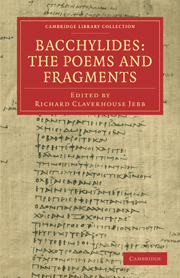Book contents
- Frontmatter
- NOTE
- PREFACE
- Contents
- BIBLIOGRAPHY
- GENERAL INTRODUCTION
- I THE LIFE OF BACCHYLIDES
- II THE PLACE OF BACCHYLIDES IN THE HISTORY OF GREEK LYRIC POETRY
- III CHARACTERISTICS OF BACCHYLIDES AS A POET
- IV DIALECT AND GRAMMAR
- V METRES
- VI THE PAPYRUS
- AUTOTYPE PLATES
- VII THE TEXT OF THE PAPYRUS
- INTRODUCTIONS TO THE ODES
- TEXT, NOTES, AND TRANSLATION
- FRAGMENTS
- APPENDIX
- VOCABULARY
- INDEX
- Plate section
II - THE PLACE OF BACCHYLIDES IN THE HISTORY OF GREEK LYRIC POETRY
Published online by Cambridge University Press: 03 May 2011
- Frontmatter
- NOTE
- PREFACE
- Contents
- BIBLIOGRAPHY
- GENERAL INTRODUCTION
- I THE LIFE OF BACCHYLIDES
- II THE PLACE OF BACCHYLIDES IN THE HISTORY OF GREEK LYRIC POETRY
- III CHARACTERISTICS OF BACCHYLIDES AS A POET
- IV DIALECT AND GRAMMAR
- V METRES
- VI THE PAPYRUS
- AUTOTYPE PLATES
- VII THE TEXT OF THE PAPYRUS
- INTRODUCTIONS TO THE ODES
- TEXT, NOTES, AND TRANSLATION
- FRAGMENTS
- APPENDIX
- VOCABULARY
- INDEX
- Plate section
Summary
The work of Bacchylides, well worthy of study in itself, derives a further interest from the peculiar place which he holds in the history of the Greek Lyric. He is the latest of the nine poets whom the Alexandrians included in their lyric canon, the others being Alcman, Alcaeus, Sappho, Stesichorus, Ibycus, Anacreon, Simonides and Pindar. In his youth, all the types of the lyric had been fully developed; and the life of lyric poetry was still vigorous. Before his death, a decline had begun. In the last third of the fifth century, exquisite lyrics continued to adorn the plays of Sophocles, of Euripides, and of Aristophanes; but, after Bacchylides, no purely lyric poet attained to a high rank. From the commencement of the Peloponnesian War onwards, the only kinds of lyric which remained fertile and popular were such as attested the degradation alike of poetical and of musical art, such productions as the dithyrambs of Philoxenus and the nomes of Timotheus.
Period of the classical Lyric.
Olympus.
Terpander.
The history of the classical Greek Lyric is comprised in a period of some two hundred years, from the early or middle part of the seventh century b.c. to about the middle of the fifth. The rise of a lyric poetry was necessarily preceded by a development of music, which was traditionally associated with two principal names. The Phrygian Olympus, a dim figure, represented some marked improvement in the music of the double flute (αὐλητική), soon followed by an advance in the art of singing to that instrument (αὐλῳδική).
- Type
- Chapter
- Information
- Bacchylides: The Poems and Fragments , pp. 27 - 55Publisher: Cambridge University PressPrint publication year: 2010First published in: 1905



